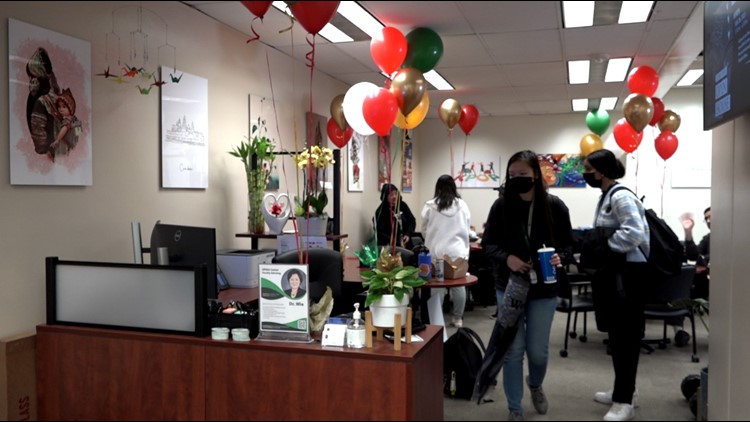SACRAMENTO, Calif. — Anticipation and excitement filled the air Tuesday as a crowd of people huddled together for the ribbon cutting of Sacramento State's new Asian Pacific Islander Desi American (APIDA) Center located in Lassen Hall.
A round of cheers and claps followed after the ribbon was cut and people ushered into the center's main lounge for the very first time.
The APIDA Center was created to educate and engage with students to foster holistic, academic, and personal development to raise cultural awareness and advocacy needs for the Asian, Pacific Islander and Desi diaspora, according to Sac State's website.
"We have over 6,500 students on campus that identify as APIDA. Now we have a key symbol on campus, that safe space for our students that builds a sense of community and allows students to see staff and faculty that come from their backgrounds," said Andrew Yang, APIDA Center coordinator and student academic success counselor.
Walking in the center, students and faculty will be able to enjoy a student lounge and workspace room, among other spaces. The walls are also decorated with art pieces created by students that reflect the diversity of the APIDA student body, as well as represent the theme of unification.
"It's so wonderful that students at Sac State have this center as a place of support and community," said Laura Ling, a journalist, author and keynote speaker at the Grand Opening and Breakfast Celebration event before the ribbon cutting.
Ling, along with journalist Euna Lee, was apprehended by North Korean soldiers while filming a documentary along the China-North Korea border. After 140 days in captivity, she was released. You can read more of her story HERE.
Ling said the center also comes at a critical time following a surge in anti-Asian hate and violence during the COVID-19 pandemic.
"I could not be more excited for the student body here at Sac State. Right now, our community has felt under attack. For this center to exist as a place of support and really a symbol of hope is really significant," said Ling.
Yang said out of a key assessment, APIDA students expressed three priorities for the center — professional mentorship, learning tangible career skills, and peer-to-peer mentorship for community building.
"For me, I know for younger generations, it may seem like there are so many opportunities out there, but you have a lack of resources, lack of people to rely on," said Phoebe Lee, a program assistant for the APIDA Center. "Having a community center helps fight the stigma of the model minority myth. This will help break the iceberg for our APIDA students to strive for more."
Right now, Sac State's APIDA Center is just one of six in the entire CSU system. Community members are hopeful for what will come in the future.
"I really applaud Sac State to be at the forefront of this and can't wait to see other campuses follow suit," said Ling.
Community members also celebrated the re-grand opening of the Martin Luther King Jr. Center, as well as announced that a Native American student center was also in the works.
"Why do these centers exist? It's because we know that when we have centers that focus on certain populations, when the center has peer support and when students see staff and faculty that look like them, it does increase student retention, academics, and I think it really helps with the achievement gap amongst our students," said Yang.





















